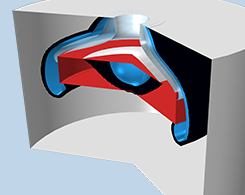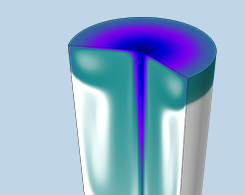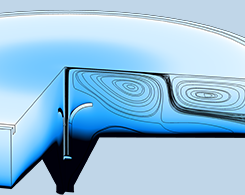Blog Posts Tagged CFD Module

Simulating Multiphase Flow in Porous Media with a Low Permeable Lens
Modeling phase transport helps you study the multiphase flow through a porous medium (such as groundwater through soil).

Studying Shock Wave Phenomena with a Shock Tube Application
Shock waves used to be a theoretical problem only. Then, shock tubes enabled experimentation, but it was costly and inefficient. Enter numerical modeling applications.

Keynote Video: Designing Improved Heart Pumps with Simulation
Abbott Laboratories designed “the most complex machine ever implanted into a human being” — an LVAD for heart failure patients — using multiphysics modeling. The result? Saved lives.

FEM vs. FVM
Finite element methods, finite volume methods, or a hybrid approach: Which is the best choice for CFD? It depends on the fluid flow problem you’re trying to solve.

Improving Architectural Designs with Building Physics Simulation
Building physics simulation can help engineers develop more energy-efficient architectural designs. We talked to Built Environments, Inc. to get a few examples of how.

How to Model Sparging in COMSOL Multiphysics®
Sparging, the process of bubbling a gas into a liquid, is seen most notably in carbonation, such as for soda and seltzer water. This mass transfer process can be modeled in COMSOL Multiphysics®.

How to Place Inlet and Outlet Boundary Conditions in CFD Simulations
When setting up fluid flow simulations, at what distance can we apply boundary conditions without interfering with the process? Here, we discuss how to place inlet and outlet boundary conditions.

Describing Viscoelastic Behavior with an Oldroyd-B Benchmark
The Oldroyd-B model is used to define viscoelastic behavior in fluids such as clay, toothpaste, and oil. We present a benchmark model for a fluid with viscoelastic behavior under strain.
